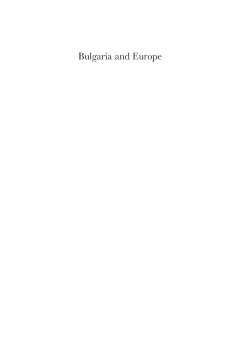
Additional Information
Book Details
Abstract
‘Bulgaria and Europe: Shifting Identities’ offers a unique analysis of Bulgaria’s relationship with the European continent. Katsikas examines how Bulgarian historiography and literature over the centuries have created differing conceptions of Europe and, in the process, shaped the country’s own shifting identity. Through his analysis, he provides the broader cultural context and historical perspective required in order to understand the country’s EU accession process as well as its aftermath. This work ultimately addresses what has arguably been the key question facing Bulgaria in the post-Cold War period: 'Are we European?'
'This volume offers an enthralling, perceptive and multifaceted analysis of Bulgaria's "Return to Europe".' —Vesselin Dimitrov, Reader in East European Politics, London School of Economics and Political Science
‘This edited volume serves as an ideal introduction to those interested in understanding where Bulgaria is coming from, where it stands today, and where it may be heading. […] The focus on shifting identities and perceptions is an integral part of the volume, with all the contributors shedding light on the ways that the relationship between the Bulgarian state and society and Europe and the EU have changed. This is a well-written and thoroughly researched addition to the literature on Bulgarian history and politics, and will be of interest both to Balkan and to EU scholars.’ —Alexandros Nafpliotis, London School of Economics, ‘European History Quarterly’ Book Reviews
Stefanos Katsikas holds a a PhD in International Relations from the School of Slavonic and Eastern European Studies at University College London, and works as a lecturer in the Department of History, Goldsmiths, University of London. He is also a visiting lecturer in the Department of Russian and Slavonic Studies at the University of Nottingham and a Research Fellow in the Department of History and Archaeology at the National and Kapodistrian University of Athens.
'Bulgaria and Europe: Shifting Identities' offers an in-depth analysis of Bulgaria’s relationship with the European continent. These essays examine how Bulgarian historiography and literature over the centuries have created differing conceptions of Europe and, in the process, shaped the country’s own shifting identity. Through such analyses, the essays provide the broader cultural context and historical perspective required in order to understand the country's EU accession process as well as its aftermath. This work ultimately addresses what has arguably been the key question facing Bulgaria in the post-Cold War period: 'Are we European?' This preoccupation with the question of Bulgaria’s European identity stems in part from the prospect of joining the EU and thus becoming part of Europe's mainstream, and equally from the wider political, economic and security vacuum in which the dissolution of the Communist bloc left the country at the beginning of the 1990s. The collection will therefore also examine Bulgaria's process of integration into the EU within the context of contemporary political and economic developments, raising questions about the costs that Bulgarians have incurred in order to join European structures. 'Bulgaria and Europe: ShiftingIdentities' charts the country's attempts to confront a problematic present while it struggles to escape from the past and its legacy of fears.
'Bulgaria and Europe' breaks new ground as the only published study to discuss the way that 'Europe' has been conceptualized within Bulgaria and how this has affected the relations between them. It is therefore the first analysis that focuses on the issue of Bulgarian national identity, how this identity has developed in relation to Europe and the way in which such a development has affected Bulgaria's relations with the European continent, including post-Cold War relations with the EU. This volume also represents an important addition to the limited amount of literature on Bulgaria available in the English language.
'Provides an excellent introduction to the country… The contributions range widely over and dig deeply into Bulgaria's history, its current condition, its culture and its relations with the Europe of which it is now an integral part.' —Richard Crampton, Emeritus Professor of East European History and Fellow of St Edmund Hall, University of Oxford
'Among the now extensive literature on Bulgaria's European accession, this collection of essays, written by an international team of well established as well as young scholars, will shine with its careful social and political contextualization of the issues, its longue durée framework, and its genuine comparative effort.' —Maria Todorova, Gutgsell Professor of History, The University of Illinois at Urbana-Champaign
